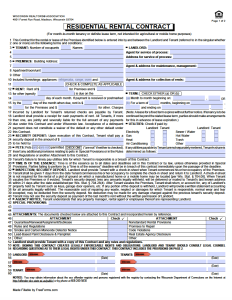
The Wisconsin lease agreement is a written arrangement committing a tenant to an agreed-upon payment for the use of a rental property for a specified length of time. The paperwork includes a summary detailing the circumstances and terms of the contract. Any stipulated clause within the content of the lease must be followed to avoid a breach of obligation.
Rental Application – Landlords, owners, and managers should always consider incorporating this application when trying to find an eligible tenant for a residential property.

Association of Realtors Version – The Wisconsin Realtors Association offers a residential rental contract that can be implemented when leasing a home.
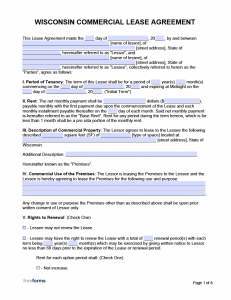
Commercial Lease Agreement – Creates a bond summing up the conditions to the rental of a property for business use.
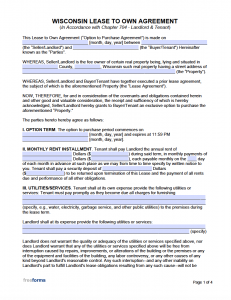
Lease to Own Agreement – Reviews the specifics of a lease arrangement with an option to purchase upon the conclusion of the term.
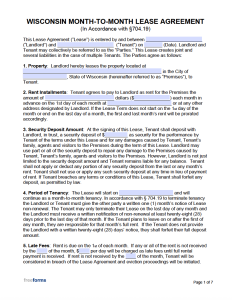
Month-to-Month Lease – The documentation of an agreement to lease a property for a confirmed period, but can be terminated with a notification from either party of at least twenty-eight (28) days in advance.
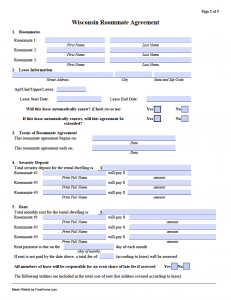
Roommate Agreement – A leasing contract that stipulates the conditions for a tenant to occupy a private room and shared space of a residence.
Standard Lease Agreement – Provides an overall log of a residential lease arrangement and it’s inherent promises made by the connected parties.
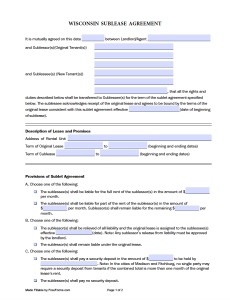
Sublease Agreement – A standard record of the commitment of a “sublessee” to effectively rent a property from a “sublessor”.
Bed Bug Addendum – Although not required by the state’s law, this document can be a valuable tool for recording the current status regarding an infestation that may or may not be contained within the property for rent or the tenant’s previous home, thus protecting both parties.
Nonstandard Rental Provisions Addendum – Within this form, the landlord can list the various charges that can be imposed concerning the rental property.
Renter’s Insurance Disclosure – This allows the landlord to disclose that their insurance does not cover the tenant’s personal belongings if they are damaged or stolen from the premises.
Rules & Regulations Addendum – A supplementary document that can be attached to the lease agreement that provides some standard terms of use regarding the property for rent.
Smoke & Carbon Monoxide Detector Notices – Provided by the landlord, this notice is delivered to the tenant to sign as an acknowledgment that the smoke and carbon monoxide detectors are functional and also informs the lessee of what to do if one of the aforementioned devices seizes to operate.
The regulatory precedents associated with landlord/tenant law are described in full and can be reviewed in the Wisconsin Legislature Statutes Chapter 704.
Identification of the Landlord or Authorized Agents – The lease must refer to the established landlord, the owner(s), or management officials that are certified to receive rental payments and maintain the residence(§ 134.04).
Shared Utilities – It must be itemized within the document, which utilities will be the responsibility of the tenant, and which will be covered by the landlord. The designation of any specific deposits that must be retained by the tenant should be denoted in this section of the agreement as well (§ 134.04(3)).
Move-in Checklist – The state of Wisconsin mandates a checklist accompany the lease agreement to be filled with the prospective tenant to assess any presented damage on the day the tenant moves into the domicile. The tenant will have 7-days prior to move-in to examine the building for physical defects. Any issues or deterioration notated on the form will not be the tenant’s responsibility upon the completion of the lease (§ 134.06).
Lead-Based Paint (42 U.S. Code § 4852d ) – For structures built before 1978, the managing official of the building must include within the lease, written notification of exposure risk to hazardous lead-based paint that can be found on the property.
Rental payments that have not been submitted to the landlord or owner will be considered late five (5) days after the stipulated due date (§ 704.90.a).
Wisconsin allows for landlords to collect a “reasonable” late fee for rent paid after the 5-day grace period, only if it is specified in the lease agreement. The state defines a “reasonable” late fee to be between $20 and 20% of the monthly rental amount due.
There is no legal statute determining a set reimbursement amount incurred, should a rental check be returned by a financial institution for insufficient funds. The lease agreement must contain language mentioning the establishment of any associated fees for bounced checks to enforce them legally.
There is no limiting restriction on the amount that an owner can require as a security deposit for a rental property. Any damages made by the tenant will be reimbursed to the landlord by deducting the amount from the funds held as a security deposit, upon the termination of the lease agreement.
Once the lease term has ended, the security deposit must be refunded within 21 days. Should the tenant decide to vacate before termination or if the tenant should be evicted from the property, the remainder of the security deposit must be returned within 21 days of the tenant leaving (§ 704.28).
A landlord or commissioned manager of the property may gain access to the property with advanced notice per § 704.05(2). Sufficient written or verbal communication is deemed as twelve (12) hours or more of advanced notification to enter the premises.